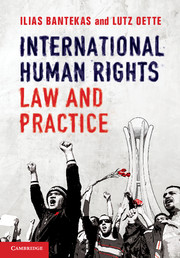Book contents
- Frontmatter
- Contents
- List of abbreviations
- Table of Cases
- Introduction
- 1 International human rights law and notions of human rights: foundations, achievements and challenges
- 2 International human rights law: the normative framework
- 3 Human rights in practice
- 4 The United Nations Charter system
- 5 The UN human rights treaty system
- 6 Regional human rights treaty systems
- 7 Individual complaints procedures
- 8 Civil and political rights
- 9 Economic, social and cultural rights
- 10 Group rights: self-determination, minorities and indigenous peoples
- 11 The human rights of women
- 12 The right to development, poverty and related rights
- 13 Victims’ rights and reparation
- 14 The application of human rights in armed conflict and the international criminalisation process
- 15 Human rights and counter-terrorism
- 16 Non-state actors and human rights
- 17 Globalisation and its impact on human rights
- Index
- References
17 - Globalisation and its impact on human rights
- Frontmatter
- Contents
- List of abbreviations
- Table of Cases
- Introduction
- 1 International human rights law and notions of human rights: foundations, achievements and challenges
- 2 International human rights law: the normative framework
- 3 Human rights in practice
- 4 The United Nations Charter system
- 5 The UN human rights treaty system
- 6 Regional human rights treaty systems
- 7 Individual complaints procedures
- 8 Civil and political rights
- 9 Economic, social and cultural rights
- 10 Group rights: self-determination, minorities and indigenous peoples
- 11 The human rights of women
- 12 The right to development, poverty and related rights
- 13 Victims’ rights and reparation
- 14 The application of human rights in armed conflict and the international criminalisation process
- 15 Human rights and counter-terrorism
- 16 Non-state actors and human rights
- 17 Globalisation and its impact on human rights
- Index
- References
Summary
Introduction
This chapter is necessarily interrelated with the one concerning the right to development but also informs all other chapters in one way or another. Globalisation is a topic that has been discussed from multiple perspectives, including the freedom offered to private actors by which to generate non-state sanctioned laws, its traversal of traditional barriers through advanced technologies and communications and the fostering of better understanding among cultures. Although there are positive connotations to the term, it is generally viewed negatively because it is perceived as a process that was created by the rich and powerful and one which brings little, or no, benefit to the poor and vulnerable.
This chapter attempts very briefly to sketch the economic rationale underpinning globalisation and explain in what manner its adherents envisaged a better world. Given that the subject matter is vast, the analysis is limited to three spheres which either drive the processes of globalisation, or upon which it produces a significant impact. We go on to explore the concept of trade liberalisation and whether its application has the potential to equitably distribute the financial benefits of a globalised marketplace. From there, we shall discuss the liberalisation of agricultural commodities with a view to ascertaining whether this is the right approach to food security in the developing world. A very particular aspect of the economic globalisation agenda is the protection of innovators and their patents. The chapter discusses the degree to which the protection of the intellectual property rights pertaining to pharmaceutical companies inhibits the right to health and in particular access to essential medicines for the impoverished. Intellectual property protection is an integral part of trade liberalisation and it is only natural that MNCs are eager to safeguard the fruits of their research as well as benefit from the competitive advantage of cheap labour offered by the plethora of poor nations vying for foreign investment.
- Type
- Chapter
- Information
- International Human Rights Law and Practice , pp. 687 - 711Publisher: Cambridge University PressPrint publication year: 2013



